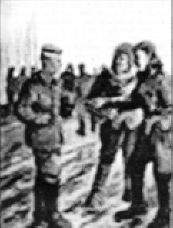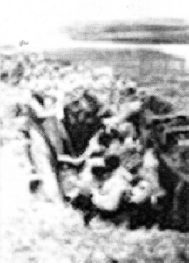WHEN HOPE BROKE OUT THROUGH THE HORROR OF WAR
While families throughout Lisburn are preparing to sit down to Christmas dinner and celebrate together, well known local minister Rev Canon Alex Cheevers recalls a very different Christmas, over 90 years ago, when soldiers at the front line in the First World War called a truce for Christmas Day.

THE First World War started in August 1914. Three months later, by the time Christmas came, there had already been a million casualties. The men who had volunteered a few months earlier to join up and go off to `the excitement of war', now realised what war was really like.
They wanted no more part of it. Instead of being home for Christmas as they had been led to expect they were stuck in the mud of the trenches of Flanders, with death and slaughter all around them.
Winston Churchill was one of those young soldiers, serving in the Ypres Salient in Belgium. And he could read the feelings of the ordinary men in the trenches.
He knew that they saw the slaughter as a senseless waste. A few weeks before Christmas, Churchill wrote home to his wife, saying "What would happen, I wonder, if the two armies suddenly and simultaneously went on strike and said that some other method must be found of settling this dispute."
Sure enough, on Christmas Eve night, that is almost exactly what happened. It all seems to have begun in the Ypres Salient, not far from Messines, when on Christmas Eve night the Germans put up small Christmas trees and candles around their trenches.

And then they began singing 'Silent Night'. The British joined in. Then the Germans shouted out across the short distance of No Man's Land: 'Merry Christmas, Tommy'. The British shouted back 'Merry Christmas Fritz'.
Then a British soldier ventured out of the trenches and walked towards No Man's Land. And a German came out to meet him. They talked. Others joined them. They showed each other photographs. They shared cigarettes. And they talked some more.
Whatever words they actually used, what they were really saying to each other was along these lines. "Look. We don't want to die. You don't want to die. We have no quarrel with each other. It's all right for the Generals sitting comfortably and safely away back behind the Front Line. They're O.K. But we're the ones getting killed! Let's stop it."
The next day, Christmas Day, was peaceful in the Salient. The two sides came out of their trenches. They shared their limited food. They told their stories. Somebody found a football and the two sides played a football match. Apparently the Germans won 3 - 2.
For the ordinary men in the trenches it must have been a ray of hope. Could they make it last?
But the Army Commanders saw it differently. They were annoyed and worried. They saw it as rebellion or mutiny.
Approach
Their approach was that if these two lots got to know each other as human beings they wouldn't want to fight and kill each other. But despite the Commanders, the truce spread. It's not certain how widespread the truce was, but spread it did.
Some would say that the truce spread, in varying degrees, along the whole front from Belgium to the Swiss Alps.
In some places along the Western Front this unofficial truce lasted from Christmas Eve until New Year's Day. But sadly, in the Ypres Salient the truce was broken on Christmas Day.
A Sergeant Frank Collins had gone across to the German trenches. He had shown the soldiers in the German trenches some photos of his wife and family. He and they exchanged simple gifts of food and Christmas treats. And then Sergeant Collins climbed up out of the German trenches and headed back for his own trenches again - only a very short distance away. As he wafted back towards his own trenches he was shot in the back by a German soldier. That broke the truce on this part of the Front and it was back to the killing. A sad story.
Today Sgt. Frank Collins lies buried in a Commonwealth War Graves Commission cemetery 'in Flanders Fields where the poppies grow'.
Somehow the story of that 1914 unofficial Christmas truce, and the death of Sgt. Collins, bring home to me the horror and awfulness of war. I can understand why someone once said 'If any man is espousing war as a means of settling a dispute, that man's country should take him out and shoot him'.
Now I wouldn't want to take that to its ultimate conclusion. But I can certainly understand why that man said it. Unless we ourselves have been there in the midst of the horror of it all - and I am so glad I haven't been - we can have no idea of the awfulness of war.
All the more reason why we should remember and honour those who did have to go through the awfulness of war. And why we should remember those who did have to pay the ultimate price.
It is in that context that I try to make it possible for as many people as possible to visit the areas where history was made, where so many of the men who made that history still lie buried.
Next year, for the fourth year, I plan to lead two tours to the battlefields of France, Belgium and Holland. The first tour, from May 20 to 26, will be to the area of the Battle of the Somme, taking in the Ulster Tower and the Thiepval Memorial to the Missing, as well as the trenches at Newfoundland Park. Then going on to the D Day Landing Beaches, and the Air Landing areas of the Battle of Normandy in 1944 - visiting places like Pegasus Bridge, Merville Gun Battery, and all five of the D Day landing beaches, both British and American.
We also visit the Commonwealth War Graves Commission cemetery at Ranville, and the American cemetery at Omaha Beach, and so much more. The second tour is from September 9-15. It begins with a visit to the beaches of Dunkirk where the British Expeditionary Force was evacuated in 1940, then moving on to the battlefields of the Ypres Salient (Passchendael). We attend the daily Menin Gate Sunset Act of Remembrance, visit Tyne Cot Cemetery, the largest British War Graves Cemetery in the world - and visit so many places which are today household names. Included as well is a visit to the First Airborne Division's 'Bridge too Far' at Arnhem, and the nearby battle area at Oosterbeek, with all of its memorials - as well as Arnhem C.W.G.C. Cemetery. Both tours take in some of the beauty of the countries we visit, including Brugge and Honfleur. Organising and leading these tours on a non-profit basis - is one of my ways of paying tribute to those who gave so much for us. If anyone would like more information without obligation, please phone me on 9269 0701.
Ulster Star
22/12/2006

